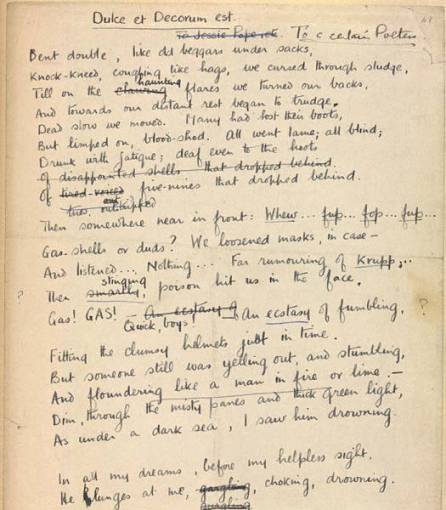Apparently, when Wilfred Owen wrote this poem during WWI, he borrowed from the Roman poet Horace for his signature line. Horace wrote the following:
Dulce et decorum est pro patria mori:
mors et fugacem persequitur virum
nec parcit inbellis iuventae
poplitibus timidove tergo.
...Which translates to...
"How sweet and right it is to die for one's country:
Death pursues the man who flees,
spares not the hamstrings or cowardly backs
Of battle-shy youths."
This website actually gives you a little bit of background on the diction choices made in Owen's poem. It's kind of interesting to see how vivid his imagery is when it is all tied together, especially through these explanations.
There is an entire body of war poetry - it is something borne out of the heartbreak of loss and the fear and stress of battle that drives men and women to write about their experiences, wondering if we civilians will ever see anything so intense, dramatic, and threatening in our own experience. It is love poetry's opposition: love poetry can be just as intense, dramatic, and threatening, but the stress gives something to the continuance of life, while war gives to the continuance of death.
Just to conclude, I found an op-ed in the New York Times that uses this title (the phrase has become something of a pop culture allusion after Owen's poem was posthumously published). Make some connections between this op-ed and the poem regarding attitudes of war. Se
Dulce et decorum est pro patria mori:
mors et fugacem persequitur virum
nec parcit inbellis iuventae
poplitibus timidove tergo.
...Which translates to...
"How sweet and right it is to die for one's country:
Death pursues the man who flees,
spares not the hamstrings or cowardly backs
Of battle-shy youths."
This website actually gives you a little bit of background on the diction choices made in Owen's poem. It's kind of interesting to see how vivid his imagery is when it is all tied together, especially through these explanations.
There is an entire body of war poetry - it is something borne out of the heartbreak of loss and the fear and stress of battle that drives men and women to write about their experiences, wondering if we civilians will ever see anything so intense, dramatic, and threatening in our own experience. It is love poetry's opposition: love poetry can be just as intense, dramatic, and threatening, but the stress gives something to the continuance of life, while war gives to the continuance of death.
Just to conclude, I found an op-ed in the New York Times that uses this title (the phrase has become something of a pop culture allusion after Owen's poem was posthumously published). Make some connections between this op-ed and the poem regarding attitudes of war. Se

 RSS Feed
RSS Feed